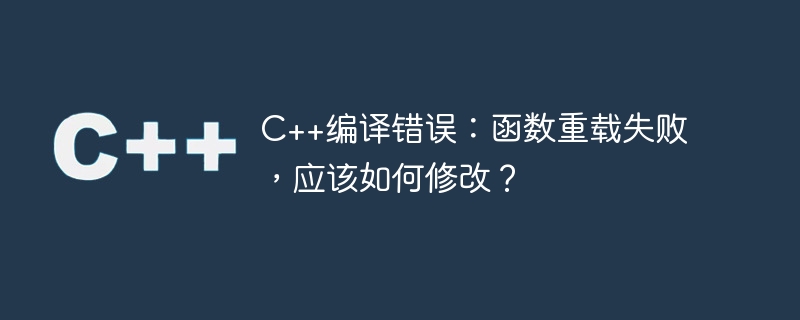

C is a high-level programming language whose function overloading mechanism can effectively improve the readability and reusability of code. However, when writing functions, sometimes we encounter function overloading failures. In this case, we need to modify the code in time to ensure the normal operation of the program.
1. The basic concept of function overloading
In C, function overloading refers to defining multiple functions with the same name but different parameter types, number of parameters, or parameter order. Through function overloading, we can make functions with the same name have different functions to facilitate code writing and calling.
For example, suppose we need to write a function to calculate the sum of two numbers. If these two numbers are integers, we can define a function:
int add(int a, int b){
return a + b;
}If these two numbers are floating point numbers, we can define another function:
double add(double a, double b){
return a + b;
}In this way, no matter what we pass in Regardless of the type of parameters, the compiler can automatically identify and call the add function of the corresponding type.
2. Reasons for failure of function overloading
Although function overloading can facilitate us to write code, sometimes function overloading fails. This situation is usually caused by the following reasons:
For example, we define the following two functions:
int add(int a, int b){
return a + b;
}
double add(int a, int b){
return a + b;
}In this example, the parameter types of the two functions are the same, both are two integers. However, their return value types are different, which are integers and floating point numbers respectively. Such function overloading cannot be compiled because the compiler cannot determine which function to call.
For example, we have defined the following two functions:
void print(char c){
std::cout << c << std::endl;
}
void print(int i){
std::cout << i << std::endl;
}The number of parameters of these two functions is 1, but the parameter types are different, one is char type, and the other is int type. During the actual call, if we pass in a character type parameter, the compiler cannot determine which function to call because both functions meet the requirements of the calling parameters.
3. How to modify the problem of function overloading failure
After discovering that function overloading fails, we need to modify the code in time to ensure the normal operation of the program. Normally, we can take the following methods:
If we find that the parameter types and return value types of two or more functions are both If they are the same, then we can modify their function names to avoid function overloading failure.
For example, we can change the above example to:
int add_int(int a, int b){
return a + b;
}
double add_double(int a, int b){
return a + b;
}In this way, we can avoid the failure of function overloading.
If we find that the number or type of parameters of two or more functions are different, then we can change one or more of them The type or number of parameters of a function to ensure that function overloading can proceed normally.
For example, we can change the above example to:
void print(char c){
std::cout << c << std::endl;
}
void print(const std::string& str){
std::cout << str << std::endl;
}In this way, we can ensure the success of function overloading when the number of function parameters is the same but the parameter types are different.
3. Summary
C’s function overloading mechanism is a very useful feature that can facilitate us to write efficient and flexible programs. However, when function overloading fails, we need to modify the code in time to ensure the normal operation of the program. When modifying, we can solve the problem of function overloading failure by modifying the function name, changing the type or number of function parameters, etc.
The above is the detailed content of C++ compilation error: Function overloading failed, how to modify it?. For more information, please follow other related articles on the PHP Chinese website!




